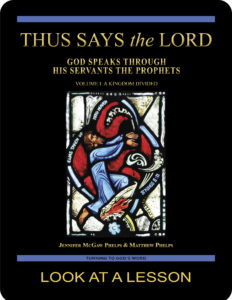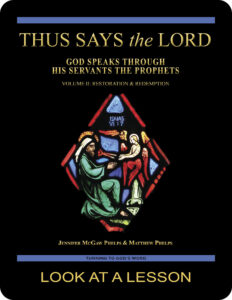faith (2)
 In the first and second chapters of the Book of Habakkuk (NABRE), the prophet encourages faith among the people who feel that the LORD isn’t listening to their cry. The prophet urges patience and ultimately faith. We’ve previously examined the root and origin of the Greek word for faith at its relationship to trust. This week we’ll look at the Hebrew meaning as a complement to that view.
In the first and second chapters of the Book of Habakkuk (NABRE), the prophet encourages faith among the people who feel that the LORD isn’t listening to their cry. The prophet urges patience and ultimately faith. We’ve previously examined the root and origin of the Greek word for faith at its relationship to trust. This week we’ll look at the Hebrew meaning as a complement to that view.
The Hebrew word אֱמוּנָה (emuwnah) is the word translated as “faith” in the Book of Habakkuk. At it’s root, it means “firmness” or “steadfastness.” The Hebrew view of faith, then, is one of being unwavering or constant. The prophet Habakkuk urges this particular view of faith as a means of relying on God and God’s promises even when it looks as though God isn’t delivering.
This Hebrew view of steadfastness or firmness clearly was shaped by the many challenges and trials faced by God’s people. Trusting or relying on God’s promise even when all seems lost became the mark of a true follower and remains so for us as Christians today.
The Litany of Trust is a related prayer written by the Sisters of Life (www.sistersoflife.org) asking Jesus for deliverance from the things that hold us bound, and placing our trust in Jesus’ promises.
related topics: belief; believe in Jesus; faith; justification; little faith
you also may like our two-part study of the prophets

 Thus Says the LORD: God Speaks Through His Servants the Prophets—Volume I: A Kingdom Divided examines the prophets in their historical context using the First and Second Books of the Kings and other Old Testament passages written before the Babylonian Exile in 586 B.C. Volume II: Restoration & Redemption looks at the post-exilic prophets. This 51-lesson Catholic Bible study builds on The United Kingdom of Israel: Saul, David & Solomon Foreshadow Christ the King. Click on the books’ covers to view a sample lesson from each volume.
Thus Says the LORD: God Speaks Through His Servants the Prophets—Volume I: A Kingdom Divided examines the prophets in their historical context using the First and Second Books of the Kings and other Old Testament passages written before the Babylonian Exile in 586 B.C. Volume II: Restoration & Redemption looks at the post-exilic prophets. This 51-lesson Catholic Bible study builds on The United Kingdom of Israel: Saul, David & Solomon Foreshadow Christ the King. Click on the books’ covers to view a sample lesson from each volume.
 Click on the picture of the statue of Moses with horns (above) to learn more about Lost in Translation. A new entry is archived each Monday. Contact us to receive Lost in Translation by email every week. You may use any of the contact links on our website to ask Matthew a question.
Click on the picture of the statue of Moses with horns (above) to learn more about Lost in Translation. A new entry is archived each Monday. Contact us to receive Lost in Translation by email every week. You may use any of the contact links on our website to ask Matthew a question.
